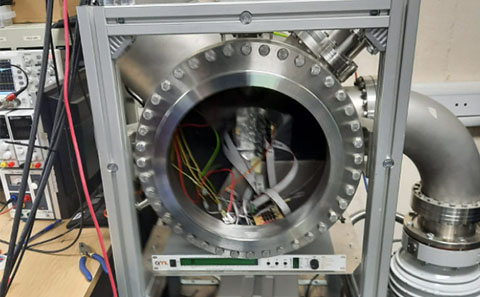Southampton astronautics expertise accelerates launch of revolutionary space propulsion system

State-of-the-art tests at the University of Southampton have advanced the development of an innovative satellite propulsion system.
British startup Magdrive is advancing the electric plasma technology to enable a new generation of spacecraft that could make the interplanetary travel seen in Star Trek a reality.
Magdrive collaborated with Astronautics research group’s Dr Minkwan Kim to perform state-of-the-art tests at Southampton that will help commercialise the new technology.
The project, funded by the national SPace Research and Innovation Network for Technology (SPRINT) programme, trialled the current prototype thruster hardware using the University’s vacuum chamber and optimised performance with expertise in magneto-hydrodynamics (MHD) simulations.
Dr Kim says: “We are pleased that our plasma simulation capability can help Magdrive to optimise their thruster nozzle design by providing a greater understanding of plasma flows inside of their thruster. Through this SPRINT project, we have built a long-term collaborative research partnership that will support the advancement of this impressive propulsion system.
The Magdrive system promises significantly improved thrust compared to other electric propulsion systems, while offering high efficiencies that chemical propulsion systems lack. This allows for extended small satellite lifetimes and for new mission types such as rendezvousing with larger satellites, constellation management, satellite refuelling and deorbiting for satellites of all sizes.
The technology’s potential would lower the barrier of small and micro-satellites to entering the space-based service industry requiring high delta-V (velocity increment), making new missions possible and allowing for a new wave of inventive UK companies to drive innovation.
Mark Stokes, CEO of Magdrive, says: “The support of the University and SPRINT provided us with external validation, higher reliability and trust that are hugely important, both in terms of credibility when securing further grant funding and talking to potential future investors, but also in helping us to roll out our product roadmap, design the next prototype and drive towards a commercial system.”
The University provided Magdrive with expert capabilities including the David Fearn Electric Propulsion Laboratory and Thermal Vacuum Test Facility, µ-VIS High Resolution X-Ray Computed Tomography (CT), the Spacecraft Environmental Vibration Test Facility, Non-equilibrium plasma simulation and the IRIDIS 5 High Performance Computing System.
The partners have planned a joint in-orbit demonstration that will take place later in 2021.